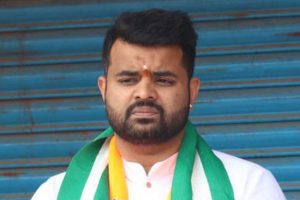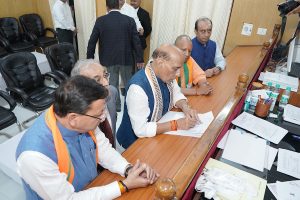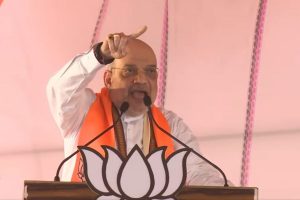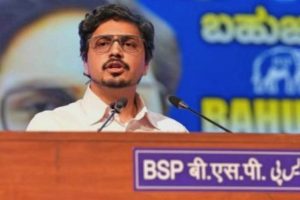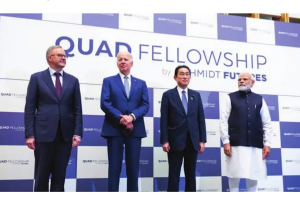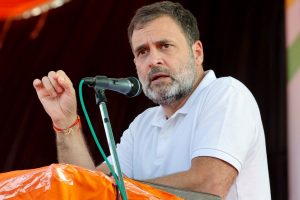For a judiciary mirroring the social diversity, President Droupadi Murmu on Sunday advocated for all India judicial service for the recruitment of judges from varied backgrounds through a process, which is merit based, competitive and transparent at the subordinate judiciary, who can rise up the ladder to the highest level of judiciary.
The Constitution Day function was preceded by the unveiling of the statue of Dr Babasaheb Bhimrao Ambedkar – the architect of the Constitution – in the fore lawns of the Supreme Court by President Murmu. The statue of Dr Ambedkar is crafted in his attire as a lawyer.
President Murmu said: “One way to hasten this diversification process can be the creation of a system in which judges can be recruited from varied backgrounds through a process which is merit based, competitive and transparent. There can be an All-India Judicial Service which can select brilliant youngsters and nurture and promote their talents from lower levels to highest levels.”
The President said this in her inaugural address at the 74th Constitution Day organised by the Supreme Court of India here today.
Stating that those who aspire to serve as judges can be selected from across the country to create a larger pool of talent, President Murmu said: “Such a system can offer opportunities to the less-represented social groups too. I leave it to your wisdom to devise any effective mechanism that you deem fit to achieve this objective of strengthening the justice delivery system.”
Having flagged her concern for “the less-represented social group” in the judiciary, President Murmu asked “whether every single citizen is in a position to seek justice” and said that there were many barriers and the cost of litigation is notable.
Stating that accessing the court for justice is one issue “close to her heart,” President Murmu said: “The cause of justice is best served by making it accessible for all. This also strengthens equality. We should ask ourselves, especially on occasions like today, whether every single citizen is in a position to seek justice. On introspection, we realise that there are many barriers in the way. Cost is, of course, the most significant factor. It is a matter close to my heart.”
President identified “language” as a barrier
for the lesser represented underprivileged sections of the society which is beyond comprehension of the majority of the citizens. “Then, there are other barriers too. For example, language, which is beyond the comprehension of a majority of citizens,” the President said.
Speaking on the occasion, Chief Justice DY Chandrachud said that the Supreme Court is constantly working to ensure legal processes become easier and simplified, so that the citizens do not languish in jails unnecessarily.
The Chief Justice said this referring that last year on the constitution day celebration, President Murumu had voiced her concern on the overcrowding of prisons and incarceration of people from marginalized backgrounds and the steps taken in repose to that.
“Madam President, I want to assure you that we are constantly working to ensure that legal processes become easier and simplified, so that citizens do not languish in jails unnecessarily. The version 2.0 of the FASTER initiative that will be launched today ensures that judicial orders of release of a person are immediately transferred to jail authorities via electronic means, so that the person is released on time,” the Chief Justice said.
Besides the judicial side, the Chief Justice said that the Supreme Court has been hearing cases relating to prisoners’ rights, overcrowding, and he has also tasked the top court’s ‘Centre for Research and Planning’ to come up with a project to improve the conditions of prisons.
Stating that justice delivery system is people centric and the people must feel assured that they can knock its door without inhibition, Chief Justice Chandrachud said: “Today, on the occasion of Constitution Day, I want to tell the people of India that the doors of the Supreme Court have always been open for you and will remain open in future also. You never need to be afraid of coming to court.”
CJI Chandrachud said the statue of Dr Ambedkar that we unveiled today in the Supreme Court premises is an extension of the thought that Dr. Ambedkar famously said that the right to approach the Court is “heart and soul” of the Constitution.
Having described the courts as people centric, CJI Chandrachud said: “Rather, it is my hope that by our efforts, citizens of every class, caste, and creed can repose trust in our court system and view it as a fair and effective forum to enforce their rights. Sometimes, we as a society may frown on litigation as a disreputable entanglement.”
“But, just as the Constitution allows us to resolve our political differences through established institutions and processes, our court system helps resolve our many disagreements through established principles and processes. In this way, every case in every court in the country is an extension of constitutional governance,” CJI added.
The function was also addressed by Union Minister of State for Law and Justice (Independent Charge) Arjun Ram Meghwal. The welcome address was delivered by Justice Sanjay Kishan Kaul, Attorney General R Venkataramani and thanks giving address by Justice Sanjiv Khanna.


